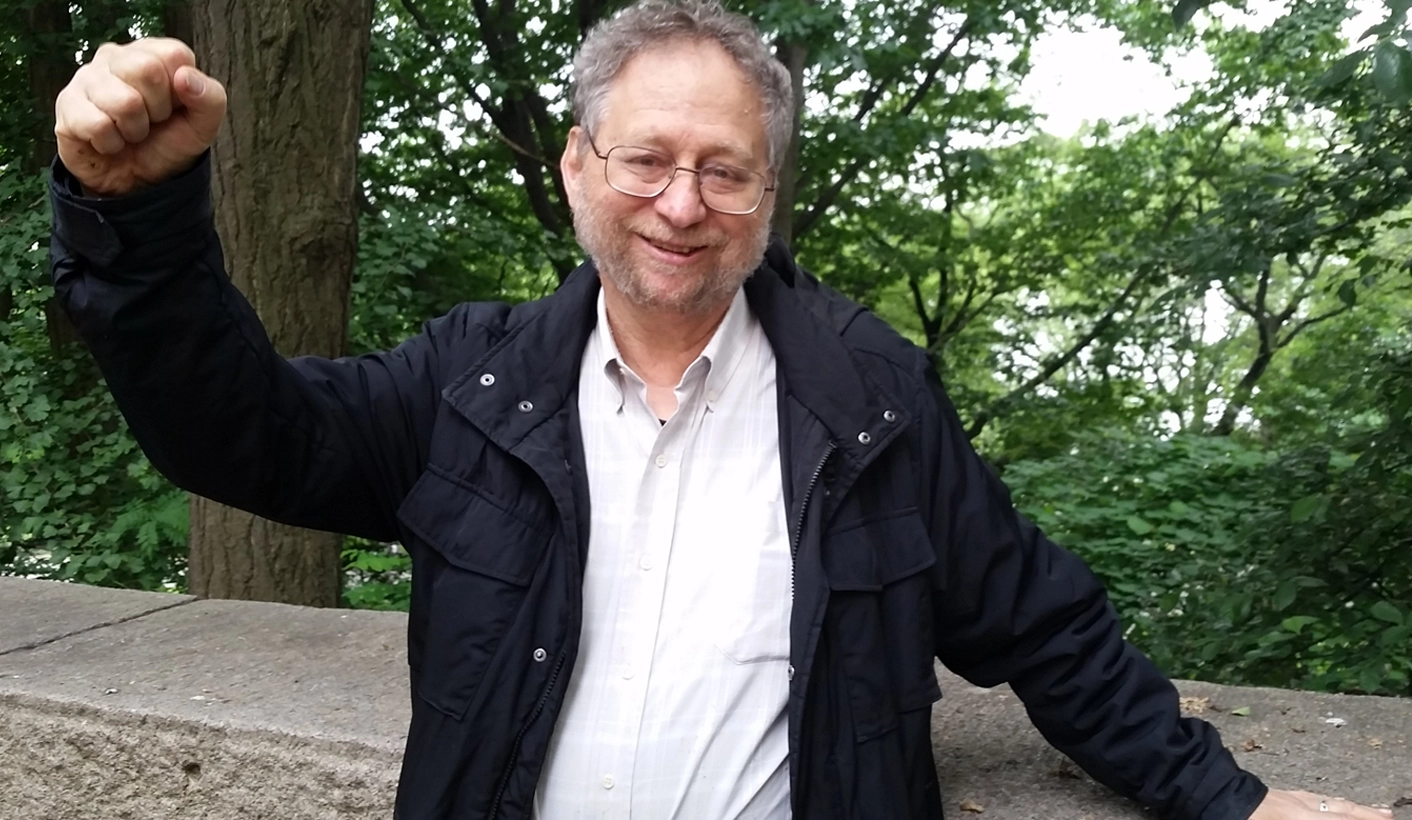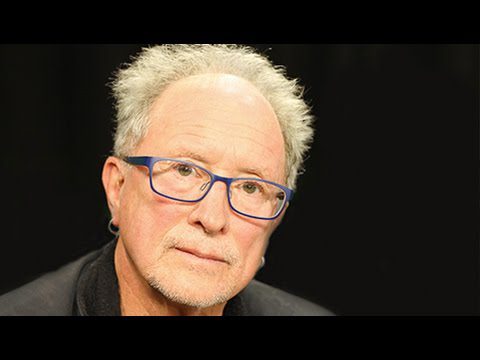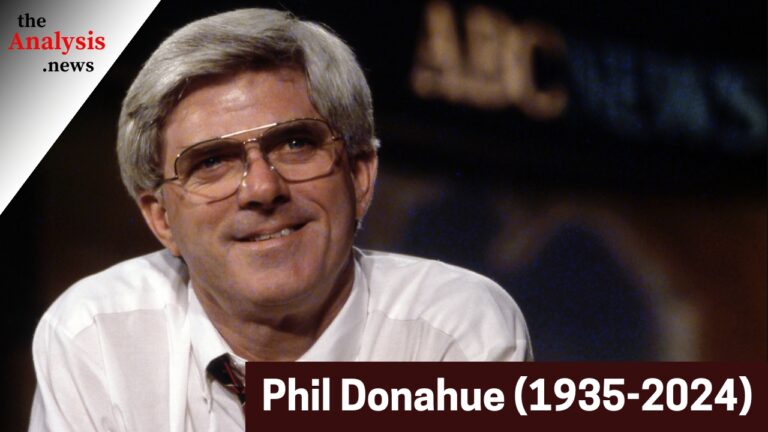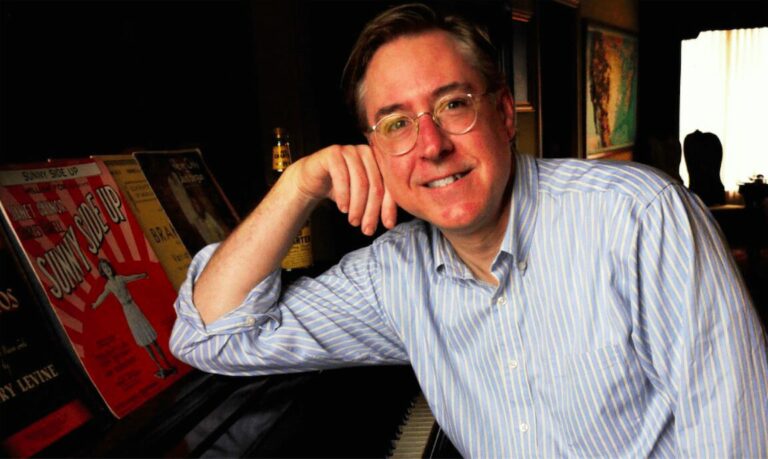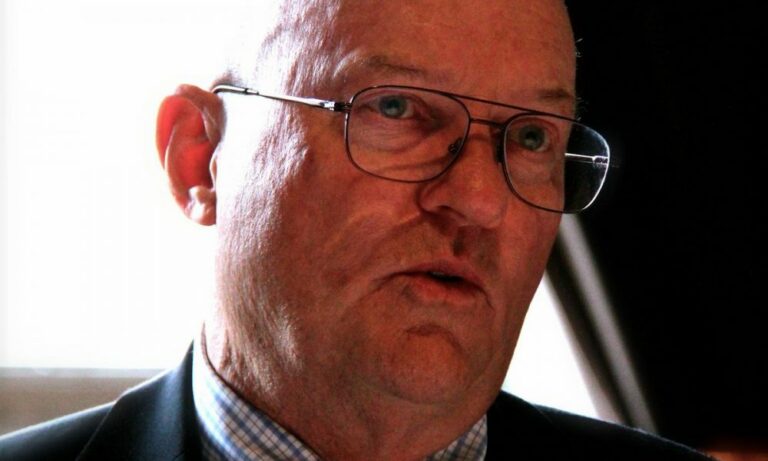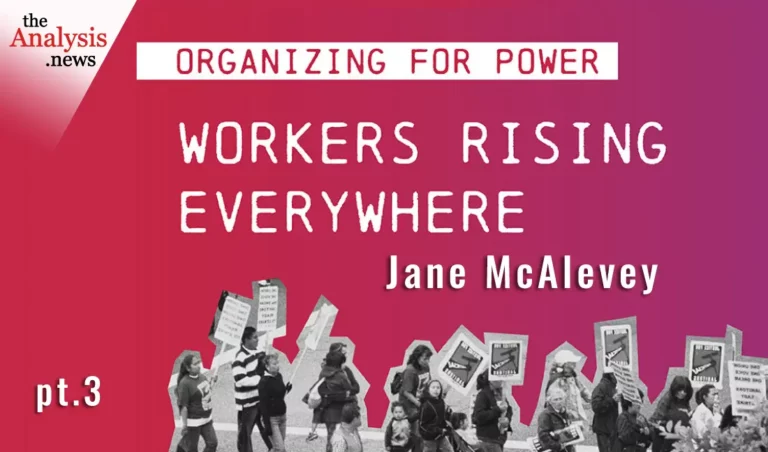Activism In My DNA – Danny Schechter on Reality Asserts Itself (pt 1/3)
This interview was originally published on February 11, 2014. In this RAI he tells Paul Jay about the fight against apartheid and meeting and chronicling Mandela in South Africa.
No posts
PAUL JAY, SENIOR EDITOR, TRNN: Welcome to The Real News Network. I’m Paul Jay in Baltimore. And welcome to a new edition of Reality Asserts Itself.
In 1955, the African National Congress established a document of principles. It was known as the Freedom Charter. The document promised, “The national wealth of our country, the heritage of South Africans, shall be restored to the people; the mineral wealth beneath the soil, the Banks and monopoly industry shall be transferred to the ownership of the people as a whole.”
Well, when the African national National Congress eventually did take power, none of those principles were in the South African–the new South African constitution. And much of that is the subject of a new book by Danny Schechter, a man that followed Nelson Mandela many times over the course of years for several films. And the new book is a culmination of that work.
And Danny Schechter now joins us in the studio.
Thanks for joining us, Danny.
DANNY SCHECHTER, EXEC. EDITOR, MEDIACHANNEL.ORG: Thank you, Paul.
JAY: So, Danny Schechter is a journalist, author, a documentary filmmaker. He’s the executive editor of MediaChannel.org, an online media issues network, and cofounder and executive producer of Global Vision, a film production company. His films include Plunder: The Crime of Our Time, which covered the subprime lending and economic crisis, and six films about Nelson Mandela. He also produced Emmy Award-winning segments for ABC news. He’s currently working on a new documentary film called The Making and Meaning of Mandela: A Long Walk to Freedom. He’s the author of 15 books, including Occupy: Dissecting Occupy Wall Street and his latest, Madiba A to Z: The Many Faces of Nelson Mandela.
So we’re going to talk about your book. We’re going to focus on Nelson Mandela. But as people who watch Reality Asserts Itself knows, we normally start with a little bit of biographical discussion about our guest. And that’s what we’re going to do with Danny.
So start with the story of Danny Schechter. It’s a long story. You have been involved in so many things. You’ve covered so many issues. You’ve lived about 19 lives. So we can’t do it all. But something I try to focus on in these interviews to start with is: what was the politics of the household you grew up with?
SCHECHTER: Right. I grew up in a home where my father had been–was a worker in the garment industry. My grandfather was a shop steward in the Ladies’ Garment Workers’ Union. So I grew up in the ethic of sort of a democratic socialist culture, and also a bit of a Yiddish culture, because we were brought up in the Bronx in a housing project, a cooperative housing project. So these values were sort of instilled in me early on, a respect for working-class culture, a respect for people who were struggling not only in the United States but around the world, and also a recognition that sort of activism was sort of in my DNA.
And I went to high school in the Bronx. I became the editor of the high school newspaper at DeWitt Clinton High School. But I also then became active in the civil rights movement, and it was there that I was really introduced to a larger world, a world of struggle throughout the United States and then, ultimately, around the world.
JAY: Okay. Before we get into your involvement in the civil rights movement, you’re born in what year?
SCHECHTER: I was born in 1942.
JAY: So you’re–.
SCHECHTER: A big war, my friend. This was World War II. Okay?
JAY: The big war.
SCHECHTER: And my father was, you know, in the Army, and my uncle was in the Army as well. So, you know, we grew up in that culture of–in a way, of deprivation, because we didn’t have a lot of money. We were dependent on, you know, the salary that a soldier gets. And I went to public school. And fortunately I was able to live in this co-op housing project built by the labor unions in the Bronx. So that’s kind of how I was nurtured and where I was nurtured.
JAY: So you’re ten or 11 years old. You’re living in this co-op. Your family’s kind of lefty, in trade unions. But it’s also now more or less the height of McCarthyism, the House Un-American Activities Committee, Cold War propaganda. And you in some ways are the target of all of that. Are you aware of it as a kid?
SCHECHTER: Well, first of all, my parents were anti-communist, not communists, because there had been bitter fights between the socialists and communists. So they weren’t really very sympathetic to the Communist Party and its politics.
On the other hand, I was attracted to folk music, and rock and roll later, and that music was the music of Pete Seeger and other people, who were called fellow travelers, people who had really promoted, you know, communist causes and issues. So I was open to it. I wasn’t really critical of it so much. But I was learning about politics through music and also through my own family.
JAY: And so your family is socialist but not–but is opposed to the Communist Party.
SCHECHTER: Right.
JAY: And on the other hand, it’s a pretty broad brush, McCarthyism and House Un-American Activities Committee. I don’t–I mean, anyone on the left–.
SCHECHTER: Well, you know, there was a joke when people protested in Union Square, and the cops chased these activists, and a guy turned around to the policeman. He said, look, I’m an anti-communist. And the policeman said, I don’t care what kind of communist you are. So, you know, those distinctions maybe were more clearer to people who were involved politically than they would be to the rest of America and the rest of–.
JAY: Well, that’s what I’m getting at. You’re clearly not part of the official accepted narrative. Does that affect you as a kid? Are you–embrace that? You’re concerned about it?
SCHECHTER: Well, I was aware, you know, of these issues. I was certainly aware of McCarthyism. I became a sort of viewer of Edward R. Murrow, the CBS journalist who took on Senator McCarthy. So my sympathies began to emerge as being critical of the right wing, critical, you know, of people who were opposing change in America and in the world.
And then when, you know, in the 1960s, as Africa emerged on the scene, I became very interested in learning more about that through Life magazine, through television, and I became interested in the larger world. So it started for me when I was, you know, 18 years old, graduating from high school, and going to college at Cornell University, listening to African music, listening to protest and folk music, Bob Dylan and others. And I think all of that helped nurture my political outlook.
JAY: So by the beginning of the ’60s you start to get really involved.
SCHECHTER: I got involved, but I was also a journalist. I edited a magazine called Dialogue, which was an effort to engage in debates between different points of view on various issues to support student activism around the world, not only in the United States, but in South Korea and in other places, in Venezuela. People were protesting against American policy, and I wanted their voices to be heard.
Later my dialog became more of a diatribe or more of a monolog, because, you know, we developed a much sharper critique of American foreign policy. The death of Patrice Lumumba was something I experienced when I was at Cornell University, and joined a protest against the U.S. role in it. So my roots in all this go back to this period.
And I was–you know, also at Cornell, as the editor of this magazine, I sponsored debates, and Malcolm X came up to Cornell at my invitation and debated a major civil rights leader, James Farmer. James Baldwin, the black writer, came up and spoke. So I was immersed in this whole intellectual culture of dissent and of, you know, a challenge to the Cold War, and also support for activism, student activism and the civil rights movement, which brought me in 1963 to Baltimore, where we are today, where I became part of an organizing project with young people, doing some of the things I think you’ll be doing in the years to come, working with the people in the community, empowering young people, encouraging them to get engaged and involved. And that’s what I did here in Baltimore. I was involved with the March on Washington in Washington, 1963.
So I go way back into this movement. And once you get immersed in it, once these values kind of sink into your consciousness and into your way of life, you don’t forget them, and they become part of you. And that led me to going to London, to the London School of Economics, where I met all these South African exiles, who recruited me to go to South Africa in 1967.
JAY: So at the London School of Economics you get involved in another protest.
SCHECHTER: Yes, I did, because we were part of the antiwar movement and challenging the Vietnam War. And there were big protests in London. And I joined those protests and, you know, was arrested but not held by the London Police as we challenged the war at the American Embassy at a large demonstration. So we had a committee there called the Stop It Committee, Americans in Britain against the war in Vietnam. So I was part of that.
But at the LSE, there was a global student body, among them many South Africans, and I became really introduced more to the anti-apartheid struggle in England and been recruited to go to South Africa in 1967, in the summer, to be part of an ANC underground action, now captured in a book called London Recruits. I was the only American who was one of those London recruits.
JAY: And what were you to do?
SCHECHTER: Well, we went to South Africa to basically challenge the apartheid system. We distributed leaflets and flyers through so-called leaflet bombs to tell people that the ANC was alive and well. I also, you know, was able to go to the funeral of Chief Lutuli (who was the president of the ANC before Mandela and who was killed under strange circumstances) and be exposed to the movement that was, at that point, the height of repression in South Africa. But they were resisting that repression and I was able to experience it.
JAY: And part of the reason to get these students from London is you white students could go do things in South Africa that black students or black activists couldn’t do.
SCHECHTER: Right. We–you know, a lot of the ANC people were in prison. Mandela had already started his prison sentence. So it was very tough for them to organize. But an American could get in because an American passport wasn’t suspect, and there were English students who went as well. And this lasted for five years, this project of activism, of–solidarity is what I would call it. And through that, I got to know and meet some of the ANC leaders in London and learn more about the history of this movement.
JAY: I’m trying to think of some of the other good footage you have. What are some other stories that coincide with the footage?
SCHECHTER: [What] we did, you know, in London, you know, we protested against apartheid, but we were also protesting against the war in Vietnam. I didn’t see those as separate struggles. We saw it increasingly is an anti-imperialist movement against American domination in the world. And the U.S., in our view, was supporting apartheid South Africa, white South Africa. So we felt it was appropriate to challenge that, that a lot of these issues sort of came together and merged in our political view at that time.
JAY: And you then did something that not many people that come from an activist background do, which is you kind of cross the line to professional journalism and mainstream journalism, and quite successfully.
SCHECHTER: Well, first I started with a magazine called Ramparts. It was the leading investigative journalism magazine of the ’60s. And I did an investigation into the CIA, and the CIA was doing an investigation into me. And I’ve gotten some of my CIA files from that period that shows that they were interested and actually had a very distorted view of me. But there’s a funny document describing me as a person who was funky looking and wasn’t–but was very popular with other students at the London School of Economics. So they were monitoring me and I was monitoring them–and through that process came to understand more about what the CIA was doing in Africa also, which was my assignment, my beat, so to speak, particularly infiltrating labor movements, infiltrating student movements, and, you know, also infiltrating liberation movements.
JAY: Meaning this was what the CIA was doing. Your beat was to follow them.
SCHECHTER: Exactly. You know. And it was like a Snowden, but without the access to the documents that he had. And, you know, we tried in our own way to make this information available. When I went back to America, I launched something called the Africa Research Group, which was an attempt to get documents and disseminate them about what the U.S. role in Africa was. So I had this long immersion in these issues.
But I also thought, well, I’ve got to find a job, I’ve got to decide what kind of career I’m going to pursue. And I ended up working in rock ‘n roll radio in Boston. I became the news director, known as Danny Schechter “the News Dissector” at WBCN in Boston. And I was there for a decade, and became a Nieman Fellow of Journalism at Harvard, and ended up working for CNN and then ABC News.
JAY: And at ABC News, you’re now doing straight mainstream journalism. So how able are you to follow, you know, the facts of the situation? You’ve come from this activist background.
SCHECHTER: Well, you know, when you work in corporate journalism, you know, you’re always working to see what you can get away with, what kind of stories you can cover and then not cover. And I was–because of my background in rock and roll I was interested in cultural stories, as well as political ones. So I did profiles of the first piece on rap on network television, a profile of Bob Dylan, a profile of Bruce Springsteen, Tina Turner, you know, of the artists that I admired and respected.
At the same time, I began to do investigative stories, including an investigation into something that happened during the Vietnam War, the children who were actually brain damaged when a plane crashed in Vietnam. And I won several Emmy awards and was able to do a lot of programs that I felt were worth doing, although there were times when you had to compromise and do what they wanted you to do, which was far less political, usually, and more cultural, or, you know, service features and this sort of thing.
JAY: So then what happens from there? ‘Cause you then wind up in what’s–you know, people call alternative media, independent media.
SCHECHTER: Well, I worked at ABC for eight years. I did 50 stories, which is a lot more than most people ever do. And I decided that the whole direction of big media was changing more towards celebrification of stories, less serious investigative reporting, less real news.
And so I left and with a partner created Global Vision, an independent television company. And one of the first things we did to put ourselves on the map was to create a television series called South Africa Now. And the idea of it was: let’s cover South Africa with South Africans. Let’s get their story through their own eyes and their own experience. And so we worked with crews in South Africa. We did 156 weeks of this series. That’s how I got to be known in South Africa, because this series later was on the air in 40 countries. And we followed it with a human rights series called Rights and Wrongs: Human Rights Television. So we covered the whole world with video diaries and analytical stories about human rights abuses and the like.
And then I began to become more interested in making longer-form documentaries. And I made almost 30 of them.
JAY: And many of them about South Africa and Mandela.
SCHECHTER: Some about Mandela, because that was an outgrowth of the South Africa Now work. You know, we did a film about him the day he was released on PBS nationwide. I did a film when he came to America, was the only person and crew allowed on the plane with him. And we traveled–.
JAY: And in the course of these films, you got to talk not only to Mandela but many of the leadership of the ANC, activists in the struggle. And it’s kind of the lessons of all of that that has led to your most recent book.
SCHECHTER: And also the anti-apartheid movement in America. People think that South Africa did this all by themselves. It’s not true. There was a large global anti-apartheid movement which supported the South African struggle and fought against the ways in which the U.S. government was collaborating with South Africa. And they led to the passage of the Anti-Apartheid Act, sanctions on South Africa, pressure on South Africa, which led to the cracking of the apartheid system. So it was an external and internal battle going on at the same time.
JAY: Okay. In the next segment of our interview, we’re going to talk about Danny’s book, which takes up many issues to do with the life of Mandela. But it’s not just about the life of Mandela. It’s also about the success and failures of a revolution. It’s not a–which isn’t just about one man.
But what I started in the introduction with, the promises of the Freedom Charter, you know, why those did not come to pass, why there wasn’t nationalization of mines and banks and such. Why is it now that there’s such continued economic inequality? And it’s a matter of a lot of discussion and debate, because it has a lot to do with what comes next, and struggles all over the world want to learn from what happened in South Africa. So we’re going to continue in part two of Reality Asserts Itself with Danny Schechter on The Real News Network.
“Daniel Isaac “Danny” Schechter was an American television producer, independent filmmaker, blogger, and media critic. He wrote and spoke about many issues including apartheid, civil rights, economics, foreign policy, journalistic control and ethics, and medicine.”
